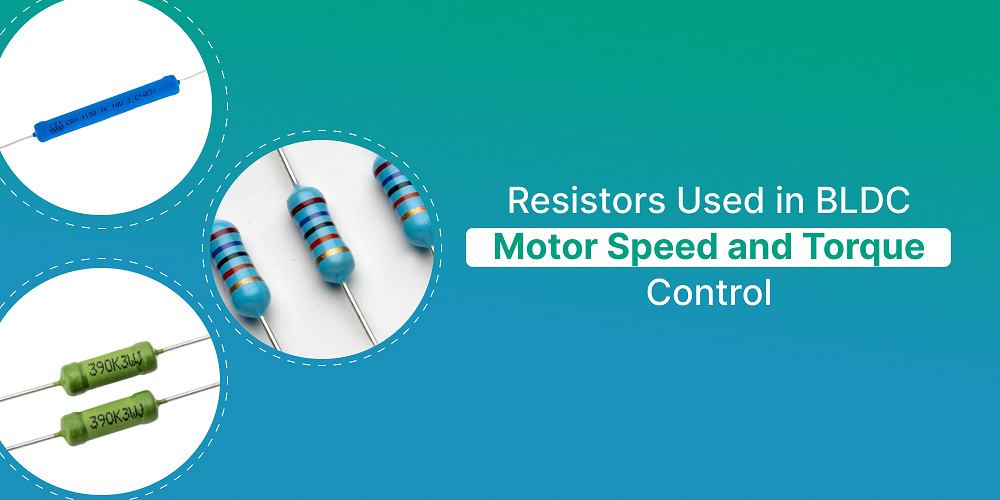
Resistors Used in BLDC Motor Speed and Torque Control
Brushless DC (BLDC) motors are now a common choice in industries and household applications because they offer superior efficiency, quiet operation, and reliable performance. From electric vehicles and fans to industrial drives and robotics, BLDC motor systems have made their presence felt in almost every sector. To achieve such dependable performance, support components are equally important. Among them, resistors used in BLDC motor systems play a crucial role in ensuring smooth operation, speed stability, and safe braking. This article highlights the importance of resistors in BLDC motor applications, their functions, and the types of resistors typically used for speed and torque control.
Why Resistors Are Essential in BLDC Motors
A BLDC motor can convert electrical energy into mechanical power efficiently, but without resistors, the motor and controller would be exposed to risks like sudden current surges, excessive voltage, and thermal stress. Resistors ensure stability by managing current and voltage while also protecting sensitive electronic parts.
In industries where precise speed and torque are critical, resistors in BLDC motor applications are indispensable. They not only help control energy flow but also contribute to long-term system safety and durability.
Key Applications of Resistors in BLDC Motor Systems
Resistors in BLDC motors are used for three major purposes:
- Current Limiting
During start-up or heavy loads, BLDC motors draw high inrush currents. Resistors limit this current to prevent damage and improve operational safety. - Current Sensing
A sense resistor, also known as a shunt resistor, measures motor current by creating a small voltage drop. This measurement provides feedback to the motor’s control unit, which in turn regulates speed and torque with high precision. Low-resistance, highly accurate shunts are best suited for this function. - Braking and Energy Dissipation
When BLDC motors decelerate, they generate regenerative energy that can cause harmful voltage spikes. Brake resistors dissipate this energy safely as heat, protecting the motor and the drive electronics. This is especially vital in electric vehicles, cranes, lifts, and conveyor systems where safe braking is essential.
Types of Resistors Used in BLDC Motor Control
Different resistor designs are used in BLDC motor applications depending on requirements such as precision, energy handling, and safety. Some key resistors used in BLDC motor systems include:
- Thick Film Metal Oxide Resistors – Unlacquered (CUL series)
These resistors are widely used for applications that require high stability and reliable performance under different conditions. - Thick Film Metal Oxide Resistors (CVH series)
Known for withstanding high voltages and delivering consistent results, the CVH series is ideal for robust BLDC motor applications. - Thick Film Metal Oxide Resistors (CSK series)
Designed for durability, these resistors are used in circuits that encounter higher energy handling needs. - Metal Film Resistors (CMR & CMMR series)
With low tolerance levels and high accuracy, these are often chosen as shunt resistors for precise current sensing in BLDC motor drives.
Each type serves a unique purpose, ensuring that speed, torque, and braking functions are handled efficiently.
Role of Resistors in Speed and Torque Control
Speed and torque in BLDC motors depend directly on current control. Resistors aid this in the following ways:
- Sense resistors provide real-time feedback that allows the controller to adjust voltage and maintain desired speed.
- Torque control becomes highly accurate because the system can detect load variations using resistor-based current sensing.
- Brake resistors improve safety during deceleration by absorbing excess energy, thereby extending the lifespan of the motor and its controller.
This makes it clear that resistors in BLDC motor operations are not optional components but core elements for control and safety.
Benefits of Using Quality Resistors in BLDC Motors
The proper selection of resistors used in BLDC motor systems offers several advantages:
- Extended lifespan of motors and controllers
- Safe braking and protection from voltage spikes
- High precision in current measurement for accurate control
- Smoother performance in applications requiring constant torque
- Improved reliability in demanding conditions such as electric mobility and industrial machinery
Everyday Applications of BLDC Motor Resistors
BLDC motors with supporting resistors find use not only in industries but also in daily life. Appliances like washing machines, refrigerators, electric scooters, air conditioners, and drones all rely on resistors for consistent performance. On the industrial side, they are used in conveyors, pumps, fans, and electric transport systems.
Choosing the Best Resistors for Your BLDC Applications
Selecting the right resistor involves evaluating factors such as the system’s power requirements, expected load, safety needs, and environment. For braking, high-power resistors with good dissipation capacity are critical. For sensing, high-precision, low-resistance resistors are essential. Partnering with an experienced distributor ensures that you always find the right fit for your specific application.
Why Cermet Resistronics
Cermet Resistronics is an authorised distributor of resistors designed specifically for power electronics and motor control. From thick film metal oxide resistors in various series to highly reliable metal film resistors, the range caters to the diverse needs of BLDC motor systems. At Cermet Resistronics, you can explore these resistor solutions that help enhance speed, torque, and braking performance for both industrial and consumer applications.
Conclusion
BLDC motors have become vital in both industrial systems and everyday machines. Without resistors, their performance and safety would be compromised. From current limiting and sensing to braking, resistors used in BLDC motor systems ensure stability, protection, and precise control. Whether it is a thick film resistor for heavy-duty performance or a metal film resistor for accurate sensing, these components are at the heart of speed and torque management. For high-quality solutions in resistors in BLDC motor applications, Cermet Resistronics provides expertise and reliable products trusted across industries.

